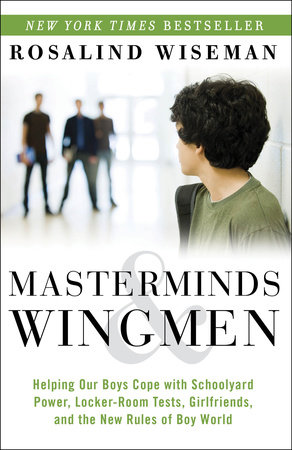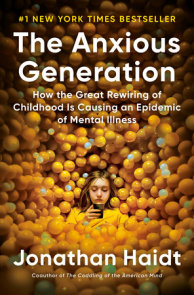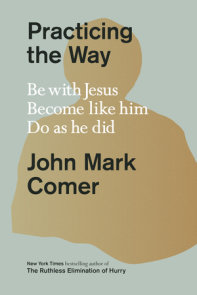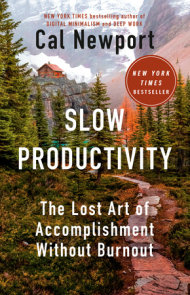READERS GUIDE
Masterminds & Wingmen overall:-What message or idea from the Masterminds has stuck with you the most?
-Have you changed your parenting style as a result of anything you’ve read?
-Was there a quote or comment from one of the boy editors that you could resonate with?
-Have you ever had an experience with your son that you wanted to ask other people about but you didn’t. What do you think stopped you?
Chapters One-Three: It’s Time to Enter Boy World, Why Doesn’t Batman Ever Smile?, Popularity and Groups
One goal of this book is to get the reader connected to the mindset of a boy growing up today. One of the best ways to do that is to remember meaningful (both positive and negative) experiences when the reader was growing up.
-When you were growing up, what gave you social status in your community? Do you remember a guy who best represented this image? Do you remember his name? Is it the same or different for your son or boys in your community today?
-Who did you look up to in school? In the community? What did these people come to be in life? Do you still look up to them?
-When you were growing up, how did you know what social status you had? Did someone tell you about your social status or did something happen where you learned about it yourself?
-What do you think people remember about you when you were a teen or a boy?
On page 34 a mom strongly voices an opinion when a boy in her car calls another boy “gay” and “retarded.” What stops us from confidently expressing ourselves when our children are around others, or even when it is just you and your son?”
Discuss:
For some people, the boy role descriptions can be hard to read because they all seem negative. Readers look for and ask about the positive leader and wish he was included in these roles. The boy editors didn’t want to list a role as the “positive leader” because they believed most parents would stop reading the other descriptions and assume that’s what their son was. These roles are also specific to a dynamic: when boys are in conflict with each other or one person is powering over another. Remember boys’ roles can change based on their environment or circumstance. Like a Mastermind who makes varsity as a freshmen and is now surrounded by older boys or a boy that can be one way with his neighborhood group and another way at school. And boys’ roles aren’t life sentences. Masterminds can realize the price of their arrogance and inability to have genuine relationships. Punching bags can learn to stand up to their friends and flies can realize that people will like them if they stop trying so hard. And strange as it may seem, Champions don’t usually like walking around thinking they are these morally upstanding people all the time.
Chapter Four: Six-Packing
-Did it surprise you to see how often we talk about girls and body image but we don’t do the same for boys?
-Can you see how boys’ body image has changed since you were a boy?
-What do you think are effective ways to talk to your son about these topics?
-Do you think men should?
Chapters Five-Eight: Breaking Through the Wall, Lying and Reconnaissance, Rage Against the Machine, Our Parenting Profile
One of the editors commented, “The problem with the advice adults give us is that they never consider social status as part of the issue.” What’s the best way to give advice where the parent acknowledges the possible social consequences of whatever action the child takes and still reinforces the value of conducting oneself ethically and honorably?
-What is your reaction to Avery’s quote on pg 102?
My mom thinks that my older brother is the more truthful person and he lies all the time. He just knows how to get away with it. When I lie I always get caught. I’m a terrible liar. After he lies, I will go to him and say why did you lie and he’ll say because I am just that good. I get so mad and I want to tell my mom and she has already laid down the law and doesn’t want to hear it. When he thinks I’m lying it feels like I am trapped so I Just say obviously you think I’m lying you got what you wished so give me the punishment. But I do hold a grudge about and that’s what I don’t tell her anything.
-Have you experienced what Avery’s talking about with boys in your life? How do you think this impacts boys’ relationships with adults in their lives? Is it confusing that boys have talked extensively about how much they lie or deceive and then get frustrated when their parents or other adults don’t believe them?
-Could you relate to the different types of lying that the boys described?
On page 193 the subject of teasing boys is discussed. The Landmine asks, “What do you tease your son about? Does he like it? How do you know?” What do you think about Rosalind’s advice about how to approach a boy in this situation? Did any adult relentlessly tease you as a child? How did you handle it?
-Parents will always embarrass their kids and in Masterminds, Rosalind describes the difference between good embarrassment and bad embarrassment. Do you have a sense of how your son is embarrassed with you? If so, how did you son respond and did you talk to him about it after?
-What do you think is the most difficult aspect of raising boys for parents to be honest about?
Chapters Nine & Ten: Social Networking, Video Killed the Radio Star
-What video games did you play when you were young?
-What games do you play now if any?
-What games does your child play? Do they play online?
-Is it hard to establish and follow through on rules you set for media and technology?
What are some of the success ways you have talked to your child about technology and how you expect him to behave while using it?
-Parents often wrap together talking with their sons about inappropriate use of technology with respecting women and girls. In Masterminds, the word dignity is usually used instead of respect to communicate that everyone inherently should be treated with worth. This is because the boys often see respect being overused or when adults are lecturing them. How do you feel about using dignity instead of the word respect?
-If you found your son participating in humiliating someone with technology (including forwarding) how do you think is the best way to approach him about it?
Chapters Eleven-Thirteen: Friendly Fire, Frontal Assault
-Have you watched your son (or daughter) have a friendship that you really didn’t like?
Why? Have you communicated to him what you feel? Looking back, what do you think your son took away from what you said?
-If you grew up around physical fighting, how does that influence what you want your son to do in a similar situation? What type of fighting have you seen? Did you or other people in your family get into fights when you were a child or boy? If you hate fighting, how do you think that has come across to your son?
What do you think about the statement, “Fighting is never the answer.” What do you think the other person you are parenting with thinks about that statement?
In the Redemption chapter, have you gone through an experience where your son really messed up that you can laugh about now? What did you want him to learn from his mistake?
Did it surprise you to read how often boys say racial slurs to each other? Do you think it’s possible for your son and his friends to say similar comments?
There’s a section called the Gray Area, where the rules about drinking are discussed. Do you think Rosalind’s advice is realistic? If not, why not?
Chapters Fourteen: No Man’s Land
What do you think are the particular challenges more socially inflexible or sensitive boys experience?
In this chapter there is specific advice about what parents should say to “neurotypical” children. Was that advice realistic or unrealistic to you and why?
Chapter Fifteen: Field of Play
What has surprised you about your reactions to your son’s involvement (or lack thereof) with sports? What has surprised you about other people’s reaction?
What first comes to mind when you remember walking into your school locker room for the first time?
After reading this chapter what do you think you need to tell your son?
Chapter Sixteen: Outward Bound
How and when should dads talk to their son about homophobia?
Do dads have a special responsibility to talk to their sons in case their sons may be gay? Do they have a responsibility to talk to their sons even if they think their son is straight?
If you were overheard a child saying something homophobic, would you say something to them–even if you knew your child really didn’t want you to?
Chapter Seventeen & Eighteen: Girl World and Girl Troubles
Moms: How has your son seen you handle confrontation in general but specifically with men? (Teachers—students)
Dads: How has your son seen you handle confrontation in general but specifically with men in comparison to women?
Do you talk to your sons about periods etc? Why or why not?
What kind of relationships/interactions do you have, if any, with your son’s girl friends or girlfriends?
Parting Thoughts:
During the book tour, I spoke with a father and he followed up our conversation with this letter:
“I am a father of two sons and a daughter. You said, ‘Locker rooms are tough situations…Those moments are seared into people’s memories.’ You caught me with my guard down because, before I could stop myself, I was remembering locker room horrors of when I was on the football team as a freshman in high school. While you were talking, I became self-conscious and embarrassed because tears were welling up in my eyes. I attended a Catholic school that was so small they combined the varsity and B-squad in the same practices. Since we practiced together, we used the locker room at the same time. The verbal, psychological and physical abuse showered on us in the locker room was a routine part of our school day.
“The team had two coaches—men who were also our teachers. One taught us science and the other taught us English. I had grown to respect and trust them, but when they put on their coaching hats I didn’t recognize them. After the second or third practice, I made the mistake of going to my English teacher for support and comfort. It turned out to be a most painful and humiliating experience: His tough-guy rebuff left me feeling hurt and deeply betrayed. I think that was the point in my life when I vowed to NEVER ask for help again—especially from men.
“For me to admit to my dad that I was scared and intimidated into joining the team—and then staying on the team—was taboo. To have a wimp for a son was intolerable. I would have rather chopped off one of my hands than to let my mother know what was going on. Every single day of the season I wanted to quit, but the fear of public shame and humiliation always stopped me. I remember the massive feeling of relief after we played our last game and turned in our jerseys and equipment.
“Over the years the intense social pressure to prove that I am a man NEVER let up. In college I joined a fraternity and went through a semester of hazing to be accepted into the brotherhood. I joined the U.S. Marine Corps and proved I was a man by surviving their boot camp and being promoted to sergeant in an infantry company.
“The man code of constantly proving oneself kept right on going when I joined the business world. So many times it is portrayed as healthy competition that keeps our economy vibrant and strong. I don’t agree. I say it is destructive and dysfunctional. It fosters distrust, enormous stress and superficial relationships, and leaves men feeling exhausted and intensely lonely. By the time I was in my 40s I’d had enough and began tentatively searching out other men who might feel the same. I eventually found them, but there were many years when it felt like I was searching for a needle in a haystack. 11 My persistence has paid off because I am now actually starting to trust some of the men in my life and consider them to be true friends. This is something brand-new to me.
“I think that the man code is deeply embedded in our culture and has been for centuries—if not millennia. But I believe that if enough men become aware of how destructive it is, we can create a systems shift. I think it’s crucial that men model this empowering way of life to other men and boys. Words are important, but actions are even more powerful.”






















